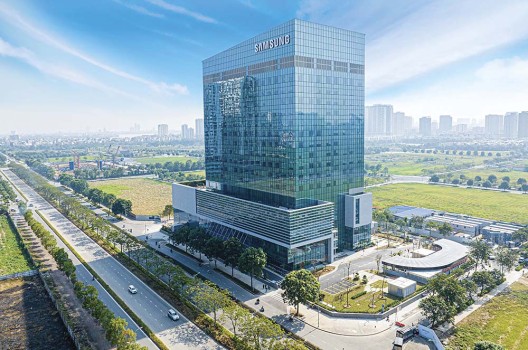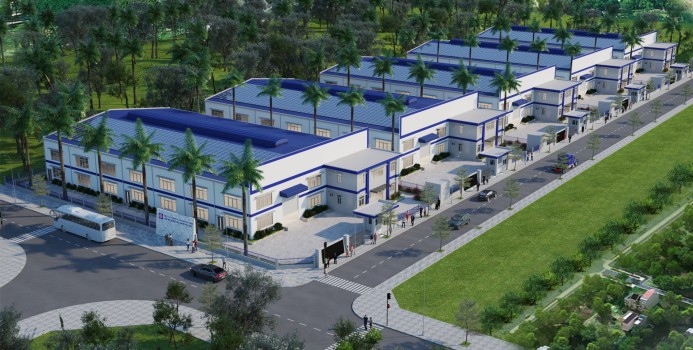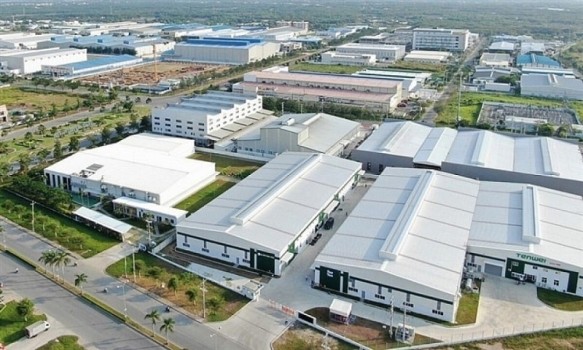ESG TRENDS IN INDUSTRIAL PARK DEVELOPMENT IN VIET NAM
ESG - A Crucial Criterion for Industrial Park Development
According to experts, developing industrial parks (IPs) with a focus on ESG not only helps businesses meet the increasingly high demands of investors but also enhances their competitive capabilities. Many large corporations now prioritize IPs with strong ESG policies, ensuring factors such as reduced carbon emissions, efficient resource management, and maintained social responsibility.
Specifically, the ESG criteria in IPs are demonstrated through:
-
Environmental (E) Factors: Applying renewable energy, conserving resources, and reducing greenhouse gas emissions.
-
Social (S) Factors: Ensuring employee welfare, building a sustainable social security and community system.
-
Governance (G) Factors: Ensuring transparency in management and applying modern technology in IP operations.
The Reality of ESG Implementation in Vietnam 's Industrial Parks
Data from the Foreign Investment Agency (Ministry of Planning and Investment) shows that by the end of July, total Foreign Direct Investment (FDI) into Vietnam reached $18 billion, an increase of 10.9% over the same period last year. Notably, over 70% of the total FDI flowed into the manufacturing and processing industry, focusing on high-tech sectors such as electronics, semiconductors, artificial intelligence, and renewable energy. The expansion of investment in these industries has led to a growing demand for industrial real estate, as businesses seek factories and infrastructure that meet modern production standards.
Commenting on this trend, Mr. Hardy Diec, CEO of BW Industrial Development JSC, stated: “Vietnam is increasingly becoming an attractive destination for the global semiconductor industry. Major corporations like Amkor, Qualcomm, Samsung, and Intel are expanding their investment plans in Vietnam. The growth potential of the semiconductor industry will be a key driver for continued growth in the industrial real estate market, thanks to the increasing demand for factories and manufacturing infrastructure.”
However, according to Mr. Nguyen Quoc Anh, Vice Chairman of the Ho Chi Minh City Industrial Park Business Association, ESG is becoming a critical criterion for foreign businesses and investors when choosing production locations. He emphasized: "If an industrial park cannot meet ESG standards, businesses will face difficulties in accessing international markets and attracting high-quality capital."
These assessments reflect the reality that integrating ESG into industrial park development is not just a trend but a key factor in determining a business 's long-term competitiveness. Several IPs in Vietnam have already begun transitioning to a sustainable development model based on ESG principles. The Investment Newspaper cites examples of IPs like Deep C, VSIP, and Amata, which are actively investing in renewable energy, water recycling, and developing industrial-urban areas to green standards. Experts also highlight the role of government support policies in promoting ESG. Currently, Vietnam is researching and developing a legal framework for sustainable IP development, which includes regulations on green certifications, tax incentives, and green credit mechanisms for businesses that comply with ESG.
View more: Viet Huong Industrial Park 2 Honored in Top 10 Green ESG Industrial Parks of Vietnam 2025
Challenges in Applying ESG to Industrial Parks
For ESG to be truly effective in practice, businesses must overcome numerous challenges related to policies, finance, and awareness. According to experts, some of the major challenges include:
-
High Initial Investment Costs: Building green infrastructure and applying energy-saving technology requires significant capital, and there is a lack of specific financial support mechanisms.
-
Lack of Unified Standards: Currently, Vietnam lacks a specific set of ESG standards for IPs, leading to inconsistent implementation.
-
Business Awareness: Many businesses still view ESG as a voluntary factor rather than a mandatory requirement, and therefore have not made serious investments.
What is the Way Forward for Businesses?
For ESG to truly become a driving force for sustainable IP development, businesses need to be more proactive in changing their strategies. Some recommended solutions include:
-
Integrating ESG into long-term strategies instead of viewing it as a supplementary factor.
-
Collaborating with international organizations to leverage capital and experience from developed markets.
-
Increasing transparency in ESG reporting to enhance credibility and attract investment.
It is clear that developing industrial parks in an ESG-oriented manner is not just a trend but a decisive factor for a business 's sustainability in a market with increasingly stringent requirements for environmental and social responsibility. To achieve this, however, requires coordination among the government, businesses, and relevant organizations to build an IP system that meets both economic and long-term sustainability criteria.
Nguồn:
Related news

09/08/2025
VIETNAM AFFIRMS ITS POSITION AS A GLOBAL TRADE AND MANUFACTURING HUB
Vietnam Affirms Its Position as a Global Trade and Manufacturing Hub

09/08/2025
VIET NAM 'S INDUSTRIAL REAL ESTATE RENT HAS INCREASED BY 70%
VIET NAM 'S INDUSTRIAL REAL ESTATE RENT HAS INCREASED BY 70%

09/08/2025
WILL THE DEMAND FOR INDUSTRIAL REAL ESTATE CONTINUE TO RISE ?
Will the Demand for Industrial Real Estate Continue to Rise?

09/08/2025
U.S. RECIPROCAL TARIFFS OFFICIALLY TAKE EFFECT
U.S. RECIPROCAL TARIFFS OFFICIALLY TAKE EFFECT
Copyright © 2022 Viet Huong IP., Ltd. All Rights Reserved
TOP



